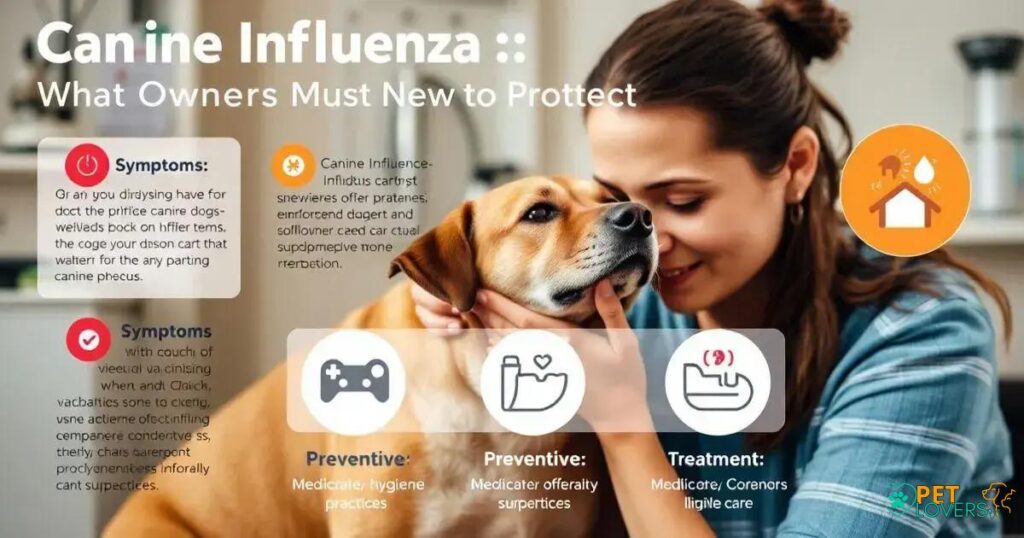Canine influenza in dogs has become a rising concern for pet owners.
This contagious viral infection can lead to severe respiratory issues and impact your dog’s health significantly.
In this post, we will delve into the symptoms to watch for, how you can prevent it, and the treatment options available if your furry friend contracts the virus.
Protecting your dog from canine influenza is crucial, and understanding this disease is the first step in ensuring their well-being.
Understanding Canine Influenza Symptoms
Understanding Canine Influenza
Canine influenza, a viral infection in dogs, often starts with similar symptoms to a common cold. The initial signs include a persistent cough, runny nose, and watery eyes. Some dogs may also experience fever, lethargy, and decreased appetite. These symptoms can lead to more severe respiratory issues if not addressed promptly.
It is crucial to monitor your dog closely. If you notice any of these symptoms, especially after exposure to other dogs or visiting crowded places like dog parks, consult your veterinarian. Testing and diagnosis are vital for determining the correct treatment.
Preventive Measures
To protect your dog from canine influenza, vaccination is highly recommended. The vaccine can significantly reduce the risk of infection and help control the spread of the virus. Additionally, practicing good hygiene is necessary. Wash your hands after interacting with other dogs, avoid contact with infected animals, and keep your dog away from areas with high dog populations during outbreaks.
If your dog is diagnosed with canine influenza, treatment primarily focuses on relieving symptoms. The veterinarian may recommend bed rest, plenty of fluids, and specific medications to ease coughing and inflammation. In severe cases, hospitalization may be required for supportive care and monitoring.
Always follow your vet’s advice for the best recovery plan. Keep your dog comfortable during their recovery, as they may need extra love and care during this time.
Preventive Measures for Canine Influenza
Preventive measures for canine influenza are essential for keeping your dog safe and healthy. The most effective way to prevent this virus is through vaccination. Vaccines are designed to protect dogs from the severe effects of influenza, making it an important part of your pet’s healthcare routine. Consult with your veterinarian to determine the right vaccination schedule for your dog.
In addition to vaccination, practicing good hygiene can significantly reduce the risk of infection. Always wash your hands after handling other dogs, and avoid sharing items like food bowls or toys. Limit your dog’s exposure to sick animals, especially during outbreaks, and consider keeping your dog away from crowded places such as dog parks or daycare facilities.
Regular check-ups with your vet can also help monitor your dog’s health and catch potential issues early. If your dog shows any signs of illness, seek veterinary care immediately to prevent the spread of illness to other pets.
Treatment Options for Affected Dogs
Treatment options for affected dogs suffering from canine influenza focus on managing symptoms and ensuring comfort. Veterinary care is critical in these cases.
Initially, your vet may recommend rest and hydration to help your dog recover. Providing a calm environment is essential for allowing your dog to heal.
If your dog’s coughing becomes severe or they have difficulty breathing, your vet may prescribe medications to ease these symptoms. Anti-inflammatory medications may also be given to reduce swelling in the airways. In more serious cases, antibiotics may be necessary if there is a secondary bacterial infection.
Some dogs might require hospitalization if their condition worsens, especially to receive fluids and monitor vital signs closely. Always follow your veterinarian’s recommendations for at-home care and any follow-up visits needed to ensure your dog is on the road to recovery.
In Conclusion: Protecting Your Dog from Canine Influenza
Canine influenza in dogs is a significant concern, but with the right knowledge and preventive measures, you can safeguard your furry friend.
Understanding the symptoms can help catch the illness early, while vaccination and hygiene practices are key to prevention.
If your dog does contract the virus, timely veterinary interventions can make a difference in their recovery.
Always prioritize your dog’s health by staying informed and prepared. By following these guidelines, you can keep your dog happy and healthy in the face of canine influenza.
Frequently Asked Questions about Canine Influenza
What are the symptoms of canine influenza in dogs?
Symptoms include coughing, runny nose, fever, lethargy, and decreased appetite.
How can I prevent my dog from getting canine influenza?
Vaccination, good hygiene, and limiting exposure to sick animals are key preventive measures.
What should I do if my dog is diagnosed with canine influenza?
Consult your veterinarian for the best treatment options, including rest, hydration, and possible medications.
Is canine influenza contagious to other dogs?
Yes, canine influenza is highly contagious and can spread through respiratory secretions and contaminated surfaces.
Can my vaccinated dog still get canine influenza?
While vaccination significantly reduces the risk, it does not guarantee complete immunity, so vigilance is still necessary.
What are the treatment options for dogs affected by canine influenza?
Treatment focuses on symptom relief and may include rest, hydration, anti-inflammatory medications, and in severe cases, hospitalization.

